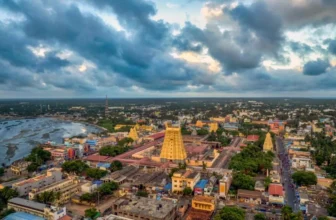The distribution of Prasad or sacred food offered to deities at Hindu temples in India holds deep cultural, religious and spiritual significance. There are several reasons for the practice of Prasad distribution:
- Blessings and Grace: Prasad is considered to be imbued with the blessings and grace of the deity to whom it was offered. By partaking in Prasad, devotees receive the divine blessings and goodwill of the deity, enhancing their spiritual connection and well-being.
- Symbol of Gratitude: Offering and receiving Prasad symbolize gratitude towards the deity for their benevolence, protection and blessings. It is a way for devotees to express their appreciation and devotion to the divine power they worship.
- Equality and Unity: Prasad distribution promotes the values of equality and unity among devotees. Regardless of social status all individuals, including visitors and pilgrims, are welcome to receive and partake in Prasad, exemplifying equality in the eyes of the divine.
- Spiritual Nourishment: Prasad is believed to have spiritual significance beyond its physical form. Consuming Prasad is considered spiritually nourishing and purifying, as it is believed to cleanse the body, mind and soul and enhance one’s spiritual growth.
- Community Bonding: The act of distributing and sharing Prasad fosters a sense of community and togetherness among devotees. It encourages individuals to come together, share a meal, and strengthen their bonds through a common spiritual experience.
- Karma Yoga: In Hinduism, the practice of selfless service, or Karma Yoga, is emphasized. Distributing Prasad is seen as a form of seva (service) to the deity and the community. It teaches humility, compassion and the importance of serving others without selfish motives.
- Sustenance and Filling Hunger, a social cause: The tradition of prasad distribution serves not only a spiritual purpose but also a practical one, aimed at supporting those in need. Temples often distribute prasad—sacred food offerings—to the poor, homeless, and devotees who may be struggling with hunger. By doing so, they ensure that no one within the vicinity of the temple goes without a meal. The prasad is typically prepared using high-quality ingredients, promoting health and well-being. In this way, the act of distributing prasad becomes a means of offering sustenance to those who might not otherwise have access to nutritious food, all while symbolically sharing the blessings of the divine. This practice underscores the belief that caring for others is an integral part of spirituality, transforming the act of food distribution into a meaningful social service.
Overall, the practice of distributing Prasad at Hindu temples in India is a cherished tradition that encompasses spiritual, social and humanitarian values. It is a way for devotees to connect with the divine, express gratitude, nourish the soul, build community, and serve others with humility and love.











